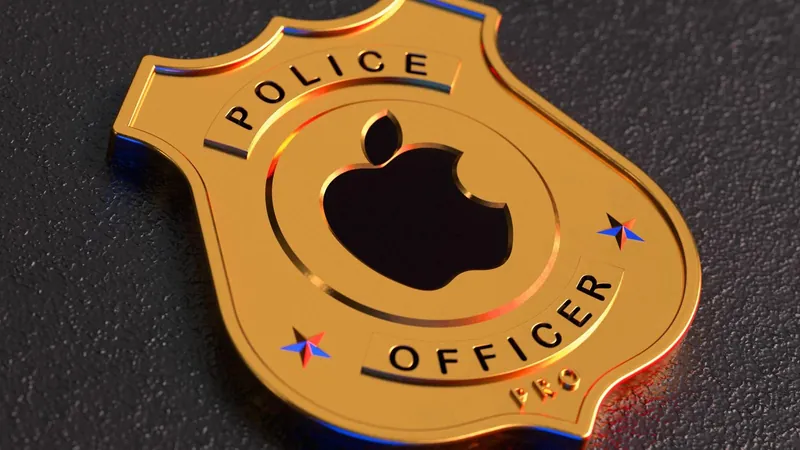
Apple's Secret Alliance with Law Enforcement: The Surveillance Superhighway
2024-10-09
Author: Kai
Apple's Secret Alliance with Law Enforcement
In a shocking revelation, it has come to light that Apple Inc., known for its pro-privacy stance and consumer-centric marketing, is actively engaging with law enforcement agencies worldwide, offering them exclusive insights into the use of its cutting-edge technology for surveillance purposes.
Reports indicate that Apple has conducted clandestine Global Police Summits at its headquarters in Cupertino, where law enforcement from seven different countries gathered to explore utilizing Apple products such as iPhones, Vision Pro, and CarPlay in policing operations. The most recent summit took place over three days in October 2023, preceding a major conference for police chiefs in San Diego.
Historically, Apple has cultivated an image of resistance to government pressures, famously refusing to help the FBI unlock an iPhone in 2015 tied to a terrorist attack. However, the company appears to have shifted its approach. Internal emails leaked to Forbes show that the tech giant has been ramping up cooperation with police agencies through multiple events and previously undisclosed projects, indicating a significant departure from its earlier stance.
John McMahon, the LAPD's deputy chief and CIO, expressed his surprise at the collaborative spirit of the summit, citing it as one of the most productive police conferences he has experienced over his 36-year career. As police departments face increasing scrutiny over surveillance tactics, the initiative by Apple brings into question the balance between privacy and safety in our digital age.
Matthew Guariglia from the Electronic Frontier Foundation pointed out the irony of Apple's dual reputation—promoting user privacy while simultaneously allowing its technology to facilitate law enforcement work. He stressed that the tech industry is cognizant of the multi-billion-dollar market generated by police partnerships, casting doubt on Apple's true commitment to user privacy.
The summit was not just a meet-and-greet; it involved technical discussions where Apple engineers listened to law enforcement needs. Attendees shared successful app implementations that leverage Apple’s technology, such as New Zealand Police's collaboration with a local developer to create the OnDuty iOS app. This application allows for easy access to sensitive information and criminal histories, showcasing how Apple can bolster police efficiency while raising privacy concerns.
Apple's tie-ups appear particularly strong within California, where agencies like the LAPD and Orange County Sheriff’s Department have been testing various applications on Apple products. The Orange County Sheriff’s Department has experimented with Apple’s Vision Pro VR headset to create virtual surveillance operations, while other agencies are interested in integrating CarPlay into their patrol cars to enhance communication and data access.
However, there are whispers of an impending shift in Apple's strategy. Following the departure of Gary Oldham, who played a pivotal role in these police partnerships, many in law enforcement are concerned about the future of such collaborations. Oldham hinted at budget challenges for the Global Police Summit, raising alarms about its potential discontinuation.
Despite these challenges, law enforcement agencies remain eager to continue leveraging Apple technology. In a tongue-in-cheek remark, after learning of the summit's cancellation, an Orange County police official joked about switching allegiance to the “Android event” instead, underscoring the growing importance of tech partnerships in modern policing.
As the debate over privacy versus security continues to evolve, the revelation of Apple’s clandestine cooperation with law enforcement could reshape the landscape of surveillance technology—and consumer trust—in the coming years. Are we witnessing the birth of a surveillance superhighway powered by the very devices we trust to protect our personal information? The answer remains to be seen.



 Brasil (PT)
Brasil (PT)
 Canada (EN)
Canada (EN)
 Chile (ES)
Chile (ES)
 España (ES)
España (ES)
 France (FR)
France (FR)
 Hong Kong (EN)
Hong Kong (EN)
 Italia (IT)
Italia (IT)
 日本 (JA)
日本 (JA)
 Magyarország (HU)
Magyarország (HU)
 Norge (NO)
Norge (NO)
 Polska (PL)
Polska (PL)
 Schweiz (DE)
Schweiz (DE)
 Singapore (EN)
Singapore (EN)
 Sverige (SV)
Sverige (SV)
 Suomi (FI)
Suomi (FI)
 Türkiye (TR)
Türkiye (TR)